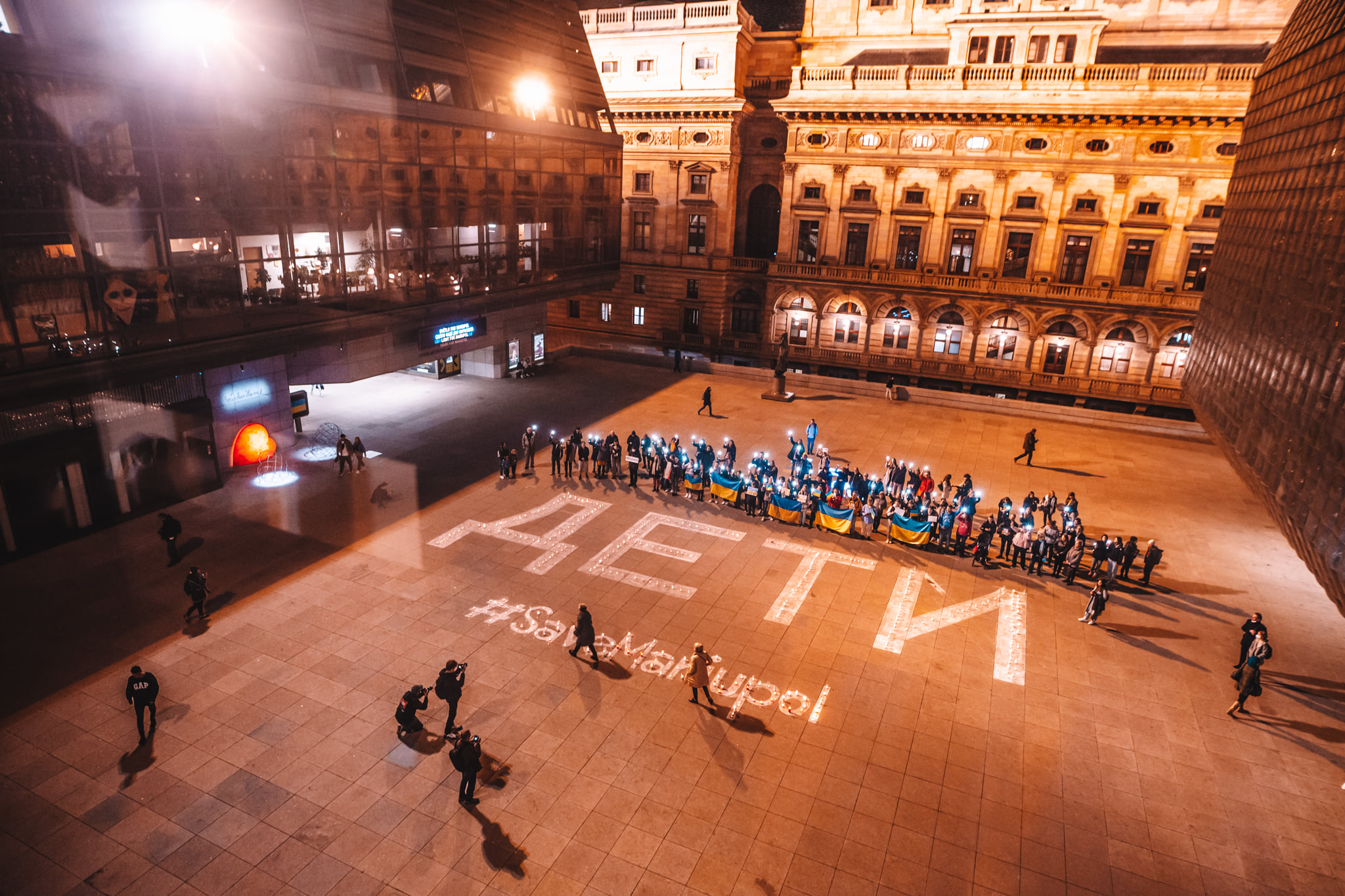
Since March 22, the #SaveMariupol campaign has been taking place in theater squares all over the world in support of Mariupol, the Ukrainian city that has been surrounded and is being systematically destroyed by the Russian army. The campaign started in Prague, where people came to the Czech National Theater with Ukrainian flags and candles and recreated the inscription “DETI” (“CHILDREN”), which was supposed to protect people at the Drama Theater in Mariupol from airstrikes. Over the past month, similar rallies have taken place in Tbilisi, Chişinău, Vienna, Brussels, Limassol, Larnaca, Dunedin, Bratislava, Zurich, Košice, and other cities.
In 2014, Mariupol became the symbol of both Ukrainian resistance and a mature Donbas because it did not succumb to Russian occupation but remained part of Ukraine.
ON JUNE 13, 2014
Mariupol was liberated from the Russian occupiers who captured the city in early April 2014. Two companies of the Dnipro-1 Battalion, the 1st Brigade of the Ukrainian National Guard, the 79th Airmobile Brigade, and the Azov soldiers took part in the liberation of Mariupol.In 2022, Mariupol has become the symbol of the suffering of occupied Ukrainian territories. Since March 1, the industrial port city has been blockaded by Russian troops who have surrounded Mariupol. Under constant shelling and with no possible safe way to leave, hundreds of thousands of people remain in the city without access to water, heat, food, or phone service.
The Russian occupation has caused a large-scale humanitarian catastrophe that has only been exacerbated by the systematic killings of the civilian population. This is a genocide of Ukrainians and the people of Mariupol. As of April 13, local authorities estimate that about 100,000 people remain in the city.
On April 17, the Mariupol City Council reported that the homes of 84,000 residents were completely destroyed — 40% of the high-rise buildings or about 2 million square meters.
According to some rough estimates, more than 10,000 people have died in the besieged city, including more than 100 children. The exact number of victims is currently impossible to determine.
The occupiers are also deporting Ukrainians. Since the beginning of April, more than 40,000 people have been deported from Mariupol to Russia or to the so-called Donetsk People’s Republic (DPR). Civilians are forcibly transferred from Mariupol to a filtration camp in Novoazovsk. Fingerprinting, biometric data collecting, and the signing of numerous documents are all part of the compulsory screening procedure. In addition, in an attempt to hide their war crimes, the Russian soldiers brought mobile crematoria to burn the bodies of dead civilians of Mariupol.
On the morning of March 16, enemy aircraft bombed Mariupol’s drama theater, where more than 1,300 civilians were sheltering against attacks. It is estimated that about 300 people died. The theater’s volunteers wrote “DETI” (“CHILDREN” in Russian) on the asphalt around the building to dissuade the enemy from shelling the building, where a lot of kids were sheltering. The inscription didn’t stop the Russians from bombing the theater. The destroyed Mariupol Drama Theater became the symbol of Russian troops’ cruelty and cynicism.
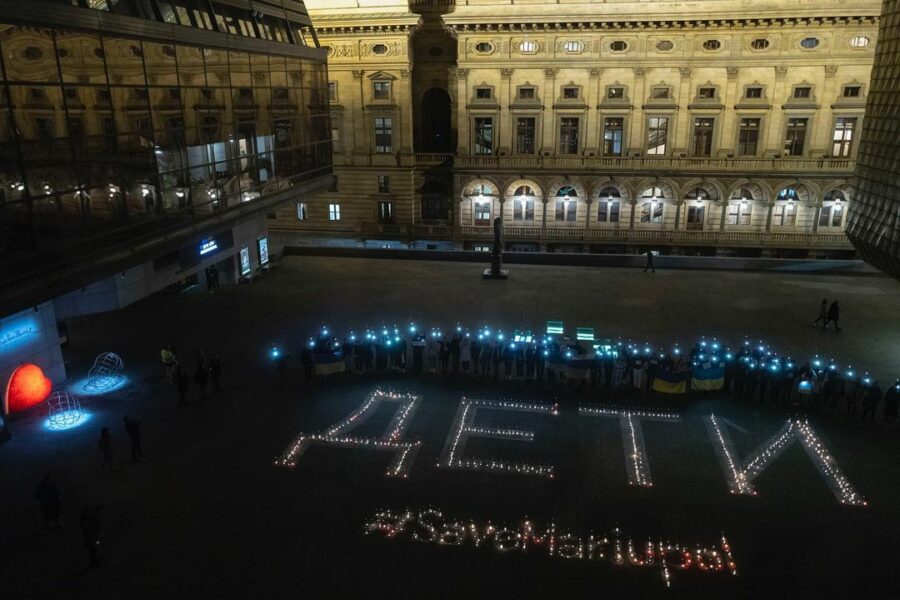
Czech Republic, Prague
This war crime committed by the Russian Federation has resonated across the globe.
On March 22, activists of the Czech initiative Stojíme za Ukrajinou organized an event in front of the National Theater in Prague. Activists laid out the inscription “DETI” (CHILDREN) and #SaveMariupol with candles. Thus, the Czech capital became the first European city to support Mariupol.
Later on, the theatrical communities of Poland, Slovakia, the Czech Republic, and other European countries recreated the event.
Khrystyna Kulakovska, a Mariupol-born journalist and photographer, has continued to organize #SaveMariupol actions all around the world after receiving permission from Stojíme za Ukrajinou activists. Through the theatrical community, Ukrainian diasporas, and volunteer organizations, Khrystyna finds local activists who help organize the events in their hometowns.
During the first weeks of April, Khrystyna and other Ukrainians who joined the initiative in their own cities managed to organize campaigns in Tbilisi, Chişinău, Vienna, Dunedin, Limassol, Larnaca, and Bratislava. The next actions will take place in Lisbon and Copenhagen.
Khrystyna Kulakovska, journalist and photographer
“I was born in Mariupol and lived there until 2004. My grandmother, who has lived in Mariupol all her life, had her house burned down after Russian occupiers shelled it. My friends, who spent two weeks under blockade, managed to leave the city on March 16th. I haven’t been in touch with my uncle and aunt who live there. My heart aches for Mariupol and half a million of its residents. Over the past eight years, the city has changed a lot and become a role model of sorts, an example of an industrial city in the country’s east that became a cultural capital with art festivals, educational projects, and the world’s first church adorned with Petrykivka paintings. Today, Mariupol is 90% destroyed.”
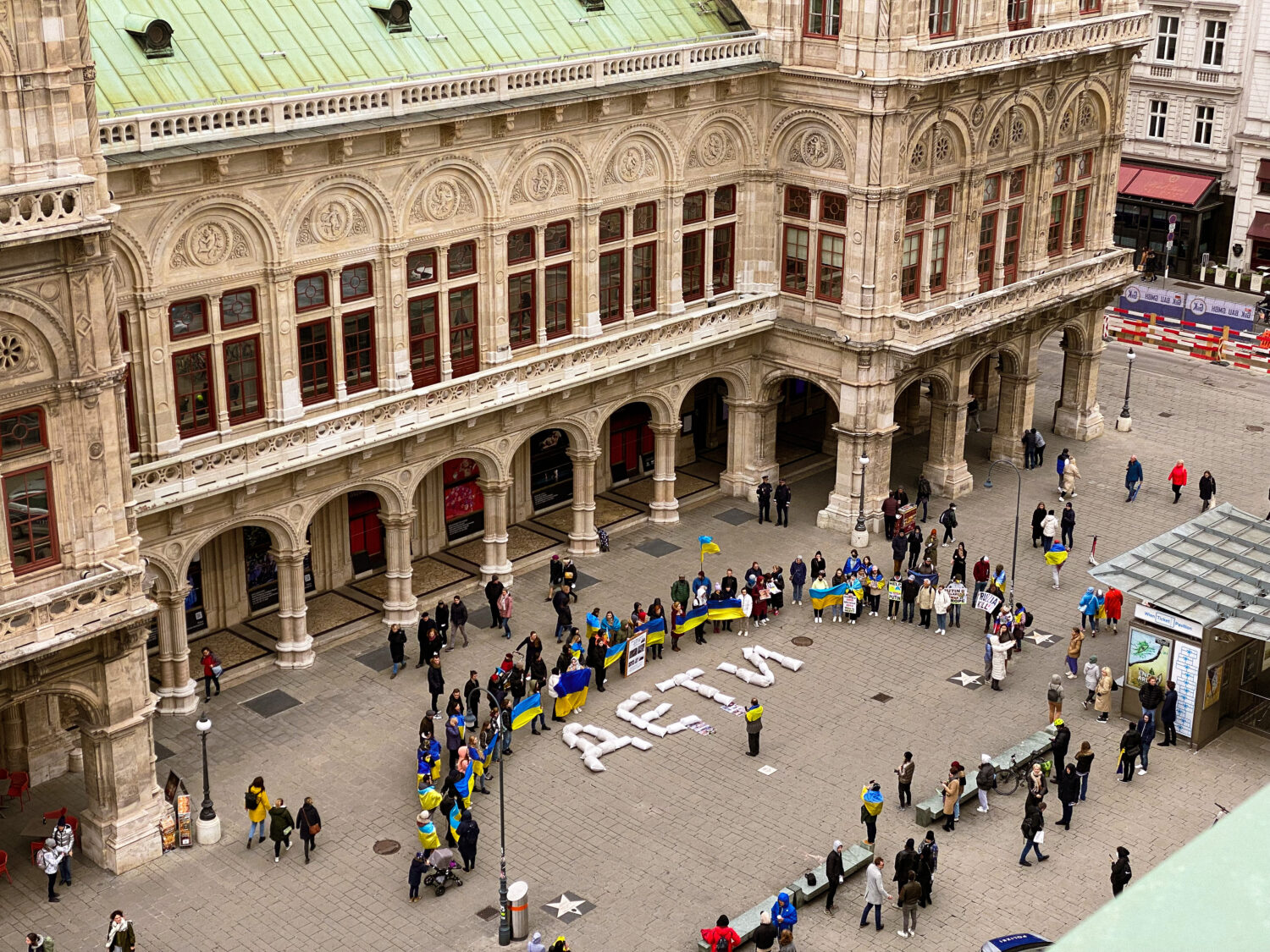
Austria, Vienna
Lidiia Akryshora, press attaché of the Ukrainian Youth Association in Austria and organizer of the action in Vienna
“It’s always easier to imagine the scale when you compare it with something that you love unconditionally. My small mountain town, where I was born and which I love very much, has about 5,000 inhabitants. Mariupol, a beautiful port city, has a population of about 450,000, three times that of Salzburg, for example, which everyone knows and loves. Despite the incessant bombing, about 30,000 people managed to leave. Therefore, for about three Salzburgs for almost two months now, there is no day or night; there is no normal life.
Keep this in mind when you’re tempted to initiate dialogue between Ukrainians and Russians and call for immediate peace. It seems to me that today, there is no nation in the world that dreams of a banal, peaceful sky over their heads more than the Ukrainian people.
For far too long, we have thought that it’s far away, won’t happen to us, and that it doesn’t matter. It’s important not to lose sensitivity to such things. To revive yourself and your feelings, to take the side of the good, and to help overcome the evil. Do not look away.
It is rather unlikely that many people thought about what would have happened if the Vienna Opera had been bombed like this. When you really pass everything through yourself, it becomes more difficult to justify remarks like: “peaceful dialogue”, “if we stop buying gas, it’ll become more expensive, people will lose jobs, everything is not that ambiguous”, “oh, Russia’s totalitarian regime makes it difficult to protest”.
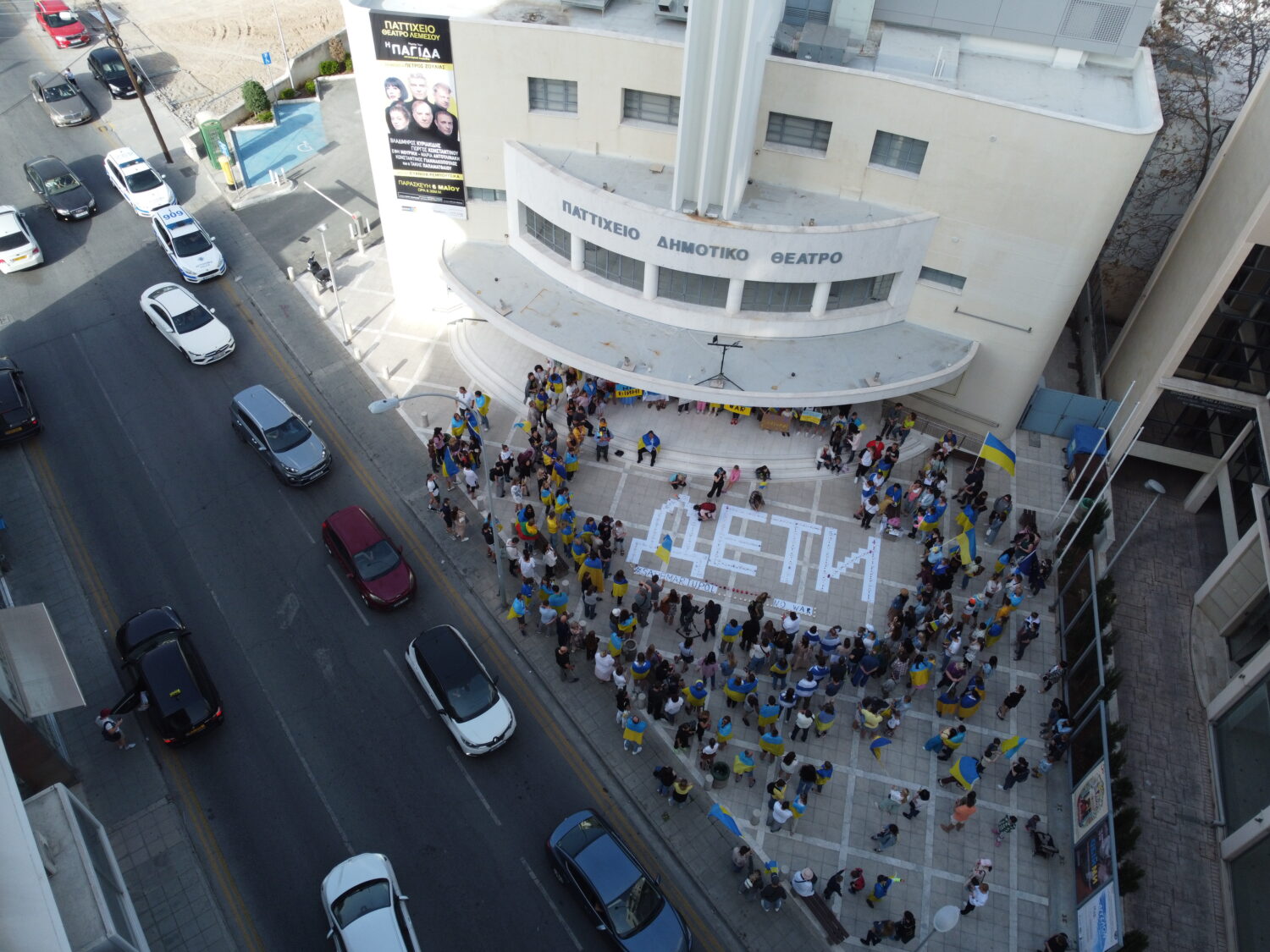
Cyprus, Limassol
Katya Maslenkova, organizer of the Cyprus action
“I found it very symbolic to organize an action exactly where there is a sea and a theater, just like in Mariupol. To honor the deceased adults and kids, and to direct attention to the city which is experiencing one of the biggest blockades of the 21st century.
After the pro-Russian actions in Cyprus (in early April, paid activists organized a rally in support of Russia under the slogan “Let’s stop neo-Nazism together with Russia”), I wanted to organize a big and inviting event as a sign of support for Ukraine. My friends and the Ukrainian community in Cyprus helped me a lot. At the rally, we managed to collect more than 230 signatures for the expulsion of Russian diplomats from Cyprus and covered the event with the help of local media.”
Ivane Kurasbediani, organizer of the action in Tbilisi, actor of the Griboedov Theatre
“Today, when a bandit invasion of the Russian army is taking place on the territory of sovereign Ukraine, to be silent (or even worse, to treat it as a nuisance) is just a heinous crime! While our state institutions, in my opinion, simply pretend to be concerned and simulate activity, our people express support for Ukrainians everywhere: on the streets, on the balconies of residential buildings, in theaters, in stadiums during official games, in educational institutions, in bars, in nightclubs, in villages, on highways, at gas stations, etc. I believe that with the efforts of the Ukrainian people and their army, as well as with the support of the entire progressive world, this war, this evil in the form of the Russian army, will be stopped. The Griboedov Theatre had multiple tours in Ukraine. I know these people very well. I have a lot of friends there. My grandmother is Ukrainian and my father was born and spent his childhood in the Sumy region. That’s why it is important for me to express my support. Ukraine won’t be defeated! Glory to Ukraine! Glory to the heroes!”
Diana Derevyanko, organizer of the action in Chişinău
“From the very first days, we have been going to rallies near the Russian Embassy in support of Ukraine. Here in Moldova, it’s important to pay attention to events in Ukraine, where not only soldiers but also civilians and kids die. Especially after the news from Bucha and Mariupol. We live in a peculiar time, both tragic and amazing.
Such campaigns are not only incredibly unifying, but they also help you learn more about your society when you see support like this.
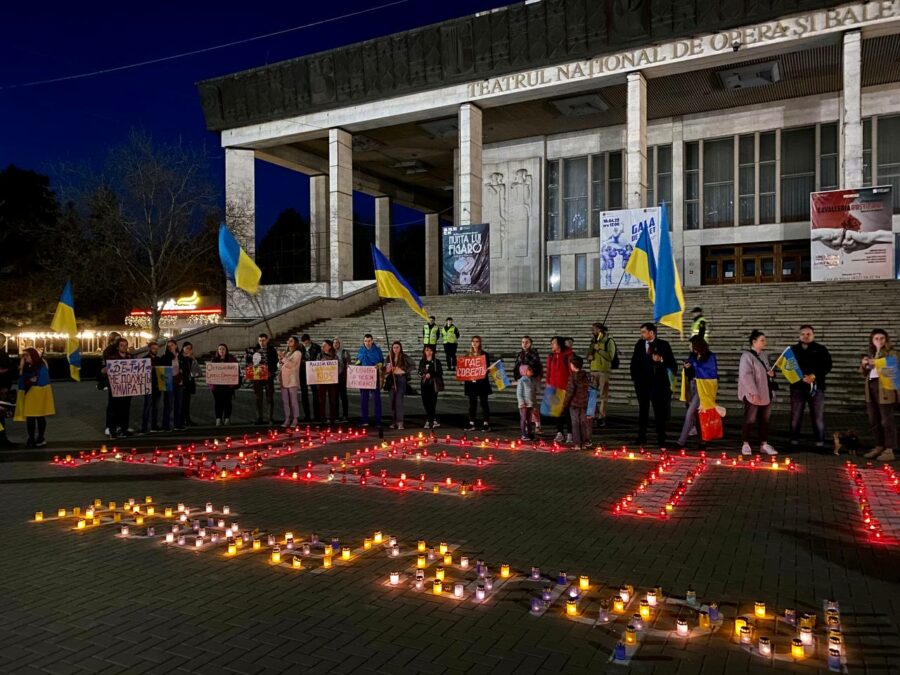
Republic of Moldova, Chişinău
Mariupol needs unblocking! The Ukrainian army needs weapons in order to protect our children and liberate Mariupol and its residents.
Friends from European and international theaters, as well as Ukrainians living abroad, we urge you to join the #SaveMariupol campaign.
It is important to continue to draw public attention and world leaders to the genocide of the Ukrainian people and the critical situation in Mariupol.
For all details about the campaign, please contact: kkulakovska@gmail.com

